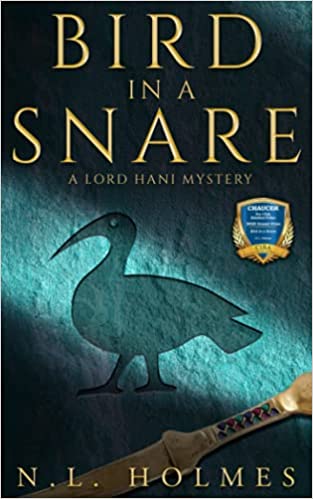Bird in a Snare by N.L. Holmes
Set in Egypt during the infancy of monotheism circa 1300 B.C.E., N.L. Holmes’s rich and often playful murder mystery Bird in a Snare will delight lovers of historical fiction. Hani, a scribe, emissary and self-anointed “minor functionary,” finds himself dispatched to a northern vassal state in order to perform a year-long murder investigation on behalf of the king, Amen-hotep III. Each of the suspects Hani considers offers both a motive and an alibi, including the commissioner and various nobles, and soon even the king of Egypt’s son and heir.
Upon his father’s death, the son immediately undertakes a series of reforms and rejiggers alliances, suggesting he had much to gain. These religious reforms, in turn, quickly impact Hani’s family when a religious leader recruits Hani’s son. Left to care for her newly-radicalized son and a disabled daughter, Hani’s wife despairs at the situation.
A family man with divided loyalties and thus a wrenching internal conflict, Hani makes for a sympathetic and often touching protagonist. Learning of “the hardship his constant absences levied on the family … tore his soul.”
As Holmes writes when introducing him, Hani has only ever sought a pleasant existence for himself and his kin: “He had no illusions about his prospects, although the favor of the king could alight suddenly in unexpected places and make a new grandee of the most modest fellow. That honor was nothing Hani coveted.” A vulnerable man with limited ambitions, Hani might truly be a “bird in a snare,” an idea reinforced by avian imagery throughout.
In addition to being sympathetic, Hani sparkles with life, offering a wry take on his surroundings and the various sketchy personages whom he encounters. He calls the king’s son “serpentine” in appearance and notes “his languid, boneless movements, the way he listened silently, watching with his remote, heavy-lidded gaze.”
Holmes’ keen attention to detail extends to all aspects of the story. Focusing on a single meal, she writes, “They sat down to substantial helpings of quail and fish. Cracked wheat, some sauce of soured milk and pickled vegetables accompanied the dishes. In a big silver jug, a fine wine of the locale sparkled, still miraculously cool.”
This suspenseful and illuminating mystery concludes with a surprising twist, leaving readers wanting more from Hani and his misadventures. An archeologist by training, Holmes uses evocative language and seamlessly weaves in minute details about Egyptian social hierarchies, religious beliefs, family dynamics, material culture and politics. Readers will find themselves illuminated by their stay in this heady — if treacherous — realm.






